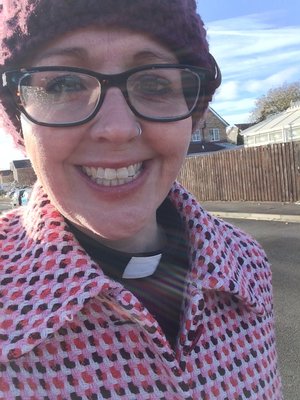So how did you get involved in ending modern slavery in the Diocese of Durham? Has it been an interest of yours for a long time?
Yes! So, before I went to college to train to be a priest I spent three months living and working in India on an anti-human trafficking initiative. It provided support for women and girls who had been trafficked into the sex industry.
Before that I was a youth worker for 15 years. I did sexual health work with young people, and targeted work with young women who were being groomed for sexual exploitation.
It all makes sense now. When I was in India I just really wanted to stay there, I didn’t want to go off to vicar school, I just wanted to end slavery. So it’s amazing to me really that it’s come back around into my work and so quickly.

So is it your faith that drives you to do this work?
Absolutely. It’s just completely unacceptable that there would ever be a price tag on a human being. We’re made in the image of God! You can’t buy a person, it’s outrageous. But also I think it’s a real gospel imperative, to set the captives free. Jesus talks about it all the time. I actually have various social justice Bible verses tattooed about my body, so it’s like I am indelibly marked with the charge to set the captives free.
What do you think some of the preconceptions are about modern slavery in the Diocese of Durham?
That it happens in India and Africa, over there to those people. That it couldn’t possibly happen here, and that we would know anyway because slaves are tied up and walk about in chain gangs! I think it’s just a really basic stereotype like that. They think it was abolished and illegal so it can’t happen. I think there’s a real lack of awareness. No one wants to imagine it’s happening.
So what have you got planned to raise awareness of modern slavery in the diocese?
We are planning an awareness raising conference for anyone who might encounter slavery in their day to day work. I’m thinking of people like those who run our food banks and our street pastors, as well as priests and curates.
What I really want to happen at that event is general awareness, but I also want every person to make a pledge that says when we go back to our place of work, we will do this one thing that we’re not doing already, in order to play our part in tackling slavery where we are. If every organisation that came said they were just going to do one more thing that would be amazing. Even if it was just, we’ll put a sign up that says this is the number to call if you want to report it.
What else do you want to do?
We are really hoping that we will be able to provide pastoral support for rescued slaves in the diocese. So that people leaving government support can be pastorally cared for by the church, in order to get themselves back on their feet, and healed and safe and secure. That’s the main ongoing thing that we’re exploring and committing to do.
QUICK FIRE QUESTIONS
Cat or dog? Dog! All day.
Tea of coffee? Coffee
Favourite meal: It was always my mum’s Sunday dinner but I am vegetarian now!
Dream holiday destination: The Maldives